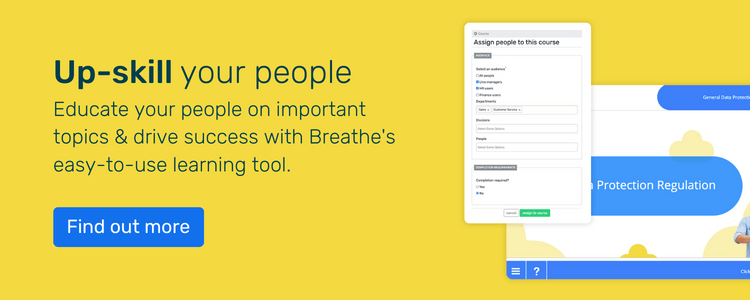How do you approach finding the right partner to deliver training to your team? In some cases, you may be lucky enough to have someone internal with the right skillset to deliver, but what do you do when you don’t have this expertise on tap?
It’s a proven fact that employee retention, productivity, creativity and motivation will all improve for organisations who provide the right employee training opportunities. This makes it incredibly important that any training you choose to introduce and action is effective and will deliver the very best possible outcomes for your team and the wider business.
So where do you start? Here is a useful checklist of points to consider to guide your decision:
1. Budget
As a general rule, in business, you get what you pay for.
Low cost generally means low quality, so beware the cheap options. Low budget solutions may appear great on the surface but may not cater to your specific requirements.
However, if your budget is tight, think about what your non-negotiables are and consider how much you may be prepared to compromise to achieve the best solution that your budget allows for.
2. Technology
This is a rapidly evolving aspect in the world of learning and development and there are some fantastic digital solutions out there.
Just remember, you need to consider how accessible a training course will be for your team with the resources they have available to them – e.g., e-learning can be challenging for staff who don’t normally use a PC in their role. A digital-first approach can be slick and modern but could alienate some categories of staff who might have fewer digital skills. Consider the needs of all staff and how you can best support those with accessibility issues.
3. Classroom vs. virtual
Is it important the team are together for training, and does that have to mean in person?
During the pandemic many of us learned to adapt and even thrive in the world of virtual meetings and training. Just because we can meet up in person now doesn’t mean it should be the default setting for training.
Live classroom training can often be more engaging but is usually also more expensive, whereas virtual training can be delivered with more flexibility and to a wider audience. It can also be helpful for employees to keep a recording of the training to review later and revisit when they want to, which enhances the value. Consider the best route for your business or mix it up and have some of each, then discuss the modes of delivery that your prospective partner can deliver and the respective costs of each.
4. Materials
High quality training materials like videos, case studies, workbooks, templates and checklists can really complement training, and help to embed the learning after it's been completed. Find out if your prospective provider can include these types of resources in their offering where required and include this in your decision process.

5. Customisation
Can the training be customised to your needs, or is it ‘off the shelf’?
A generic course may not cover the content to your specific requirements and could leave a gap in the training. It’s better to focus on the particular issues your employees need help with, (for example, how to conduct a return-to-work interview) rather than a broader spectrum course on managing staff absence, that only skims over the bits where your team may need the most help.
6. Reputation
A professional trainer will have a website, so check it out – look for case studies and any reviews and testimonials as evidence of their credentials. They should also be on LinkedIn, so check out their profile and see what people are saying about their work. Is it all gloss and no substance? Remember to be thorough.
7. Experience & technical knowledge
It might sound obvious but check they have trained on this topic before and ask if you can see a proposed course outline.
Consider if they have the appropriate depth of technical knowledge on your required subject - you need to know they will deliver the training with confidence. Many trainers by nature are confident public speakers, but this needs to be matched by appropriate expertise or it could all unravel, and you could risk losing credibility with staff.
Still, technical experts don’t always make for good trainers – can they deliver content in an engaging way, even with very technical subject matter? Don’t be shy to ask to speak to one of their previous customers if it will help you make the right decision.
8. Culture & values fit to your business
Are they your kind of people?
Do they mirror your values e.g., embracing diversity and inclusion; concern for the environment? If the fit isn’t right, then the training could land badly and even upset some colleagues. This can be avoided if you complete the appropriate due diligence checks mentioned above in points 6 and 7. Don’t be afraid to ask questions about their company culture.
9. Accreditations
Are they available with the training? Do you consider official accreditation necessary under the circumstances?
The provider may issue some form of certificate at the end of the training, but is it worth the paper it’s printed on? This will depend on the type of training provided and industry you are operating in. The accreditation may be required to prove competence and also be recognised by external organisations, such as trade bodies.
Discuss the forms of accreditation that your partner can provide and if there are any add-on costs linked to these e.g., delegates needing to be a member of a professional body first and any ongoing cost commitments.
There’s plenty to consider when it comes to discovering the best approach on finding the right trainer for your needs. These top 9 tips are the most important things to consider in your decision-making, to get the best solution for you and your employees.
Breathe’s Learn module can help you up-skill your people and drive success. Discover training courses for employees in the e-learning platform.
This guest blog was written by Nicola Hilliker, Senior HR Consultant at Cornerstone Resources HR.
Cornerstone Resources HR are HR partners of Breathe. Find out more about receiving professional HR support & our Partner programme.

Author: Nicola Hilliker
Nicola is a Senior HR Consultant with Cornerstone HR who enjoys designing and delivering effective training solutions with engaging and interactive content for her SME clients. When not working, she enjoys quality family time including country walks with her energetic Labrador.




